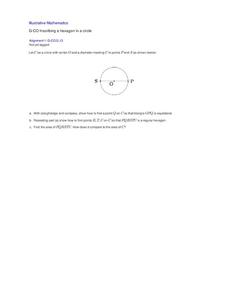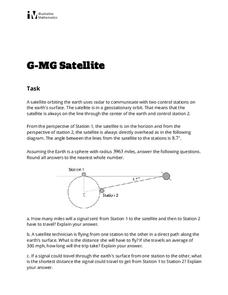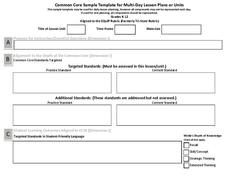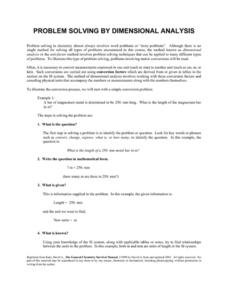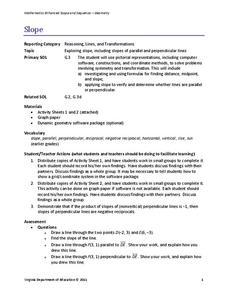Curated OER
Super Size It, Please!
Pupils take photos from a given distance and determine the height of the person using a scale factor. Pupils calculate the ratio of student actual height to student photo height. They take pictures from 3 different distances to see if...
Curated OER
Inscribing a Hexagon in a Circle
This activity is a follow-on activity to inscribing a square in a circle. The overall problem is more complex. It deals with geometric constructions, properties of triangles, and regular hexagons. The final part of the activity finds the...
Illustrative Mathematics
Dilating a Line
High School geometers verify through experimentation certain properties about dilations. This multi-step problem challenges them to construct examples of dilations to verify specific facts, the final step provides an opportunity to more...
Illustrative Mathematics
Coupon Versus Discount
All too often stores give coupons for an item, but when you go into buy it, the item is on discount. The store won’t take the coupon if the discount is used. So what do you do, use the coupon or take the discount? This activity helps...
Curated OER
Course of Antibiotics
This model of the amount of anibiotics in a person's system is represented abstractly by a finite geometric series. Learners translate this real-life situation into algebraic form and then extend their knowlege by answering questions...
Curated OER
Building a Quadratic Function Form
Comparing the movement of graphs geometrically when small changes are made to the parent function motivates this collaborative discussion on the transformations of functions to their various forms. Vertical and horizontal shifts due to...
Curated OER
Exponential Growth versus Linear Growth II
Your algebra learners discover that exponential functions, with a base larger than one, outgrow linear functions when the inputs increase sufficiently. Their analysis includes using a graphing calculator to produce tables.
Illustrative Mathematics
Computations with Complex Numbers
This quick set of problems provides a brief refresher on the arithmetic of complex numbers. Learners need to multiply, add and subtract, and remember features of i when raised to a power. Included solutions are clear enough that learners...
Illustrative Mathematics
Satellite
Learners practice relating rules of trigonometry and properties of circles. With a few simplifying assumptions such as a perfectly round earth, young mathematicians calculate the lengths of various paths between satellite and stations....
Classrooms in Action
Common Core Sample Template for Multi-Day Lesson Plans or Units
Make sure you've covered all your bases when designing a Common Core unit. From essential questions and standards alignment to instructional supports and reflections, this template will guide you toward completing a comprehensive,...
Illustrative Mathematics
Running Around a Track I
The accuracy required by the design and measurement of an Olympic running track will surprise track stars and couch potatoes alike. Given a short introduction, the class then scaffolds into a detailed analysis of the exact nature of the...
Technical Sketching
Introduction — Surfaces and Edges
How different can 3-D and 2-D really be? An engineering resource provides an explanation about the importance of two-dimensional technical drawings. Several samples show how to create multi-view drawings from pictorials and vice-versa....
Chymist
Problem Solving by Dimensional Analysis
Is your class in another dimension with regards to dimensional analysis? Give them some extra practice with a straightforward activity. Learners convert units by following concise step-wise examples, including setting up the problems....
NOAA
Waves
Is it possible to outrun a tsunami? After watching a presentation that explains how waves and tsunamis occur, class members investigate the speed of tsunamis triggered by an earthquake.
Teach Engineering
Energy Skate Park
Skate through a simulation on energy with an a activity that uses a computer simulation of a skater to reinforce the concept of conservation of energy. The resource guides pupils through scenarios using the computer simulation to see the...
Teach Engineering
Energy and the Pogo Stick
Let your class bounce to examine the concept elastic potential energy. Individuals bounce on a pogo stick in order to calculate its elastic potential energy. Groups then compare the elastic potential energy to the gravitational potential...
Denver Public Schools
Kung-hsi Fa-ts' ai! – A Chinese New Year Celebration
Looking for ideas for your Lunar New Year celebration? Check out an interdisciplinary unit of study that includes lessons in counting, calligraphy, culture, geography, literature, art, and music. Kung-hsi Fa-ts' ai! (May you become rich!)
University of Colorado
Are All Asteroids' Surfaces the Same Age?
Did you know scientists can tell the age of an asteroid by looking closely at its craters? This final instructional activity of a six-part series focuses on two asteroids, Gaspra and Ida, in order to demonstrate the concept of dating...
Teach Engineering
Microbes Know How to Work!
Scholars harness the power of microbes with an engaging activity that uses yeast to break down sugar in water. Multiple setups of the same experiment lets learners determine which temperature results in the fastest rate of sugar...
02 x 02 Worksheets
Slope
What does slope have to do with lines? Pupils work with lines and determine the slope of the lines informally and with the slope formula. Groups use their knowledge to calculate the slopes of parallel and perpendicular lines. They also...
Teach Engineering
Fun Look at Material Science
Introduce materials science with a class demonstration. After showing a PowerPoint presentation on materials and their properties, instructors provide a ceramic tile, a Popsicle stick, a paper clip, and a plastic bag as examples of...
Space Awareness
Valleys Deep and Mountains High
Sometimes the best view is from the farthest distance. Satellite imaging makes it possible to create altitude maps from far above the earth. A three-part activity has your young scientists play the role of the satellite and then use...
Cornell University
Diffraction Demystified
Study diffraction patterns using CDs and DVDs! Scholars measure the diffraction patterns of a light wave as it hits a CD or DVD. Using the information, they can measure the distance between the tracks.
Alabama Learning Exchange
Building Functions: Inverse Functions from Tables and Graphs
Is the inverse a function? Scholars learn how to examine a function to answer this question. Using an online interactive, they examine the properties of inverse functions to compare to the original function.



